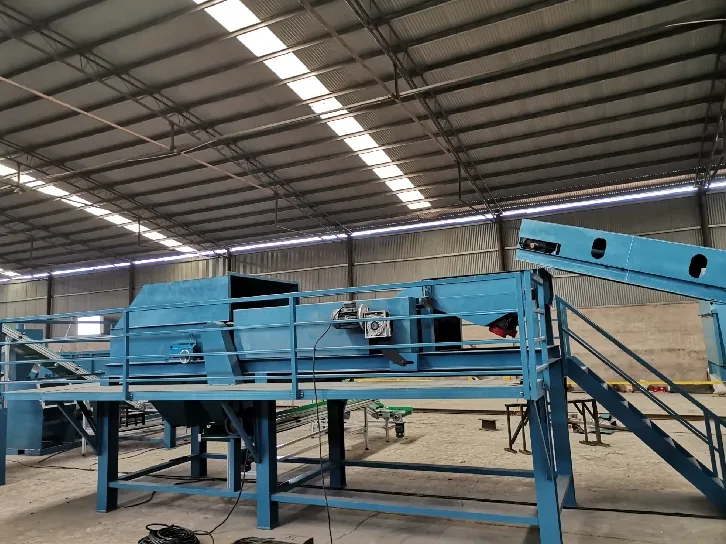
10 月 . 02, 2024 14:29 Back to list
The Importance of Aluminum Recycling Plants
Aluminum is one of the most widely used metals in the world, thanks to its lightweight, durability, and resistance to corrosion. It plays a significant role in various industries, including automotive, aerospace, construction, and packaging. However, the extraction and production of aluminum come with considerable environmental impacts, such as high energy consumption and greenhouse gas emissions. As a solution to these challenges, aluminum recycling plants have emerged as crucial components in promoting sustainability, reducing waste, and conserving natural resources.
The Aluminum Recycling Process
The aluminum recycling process involves several steps that transform scrap aluminum back into usable materials. The first step is the collection of aluminum waste, which can come from a variety of sources, such as discarded beverage cans, old appliances, automotive parts, and construction materials. Once collected, the aluminum is sorted to remove impurities and separate different grades of aluminum.
Next, the sorted aluminum is shredded into smaller pieces, which helps facilitate the melting process. In an aluminum recycling plant, these small pieces are then melted in a furnace at high temperatures. This melting process consumes significantly less energy—about 5% of the energy required to produce new aluminum from raw materials. Once melted, the aluminum can be poured into molds to create ingots or other forms of aluminum products.
Finally, these recycled aluminum products can be sold to manufacturers who will use them to produce new items. Not only does this process help to reduce energy usage and emissions, but it also minimizes the need for mining and refining new aluminum, thereby conserving valuable natural resources.
Environmental Benefits
The environmental advantages of aluminum recycling are substantial. Firstly, recycling aluminum saves up to 95% of the energy needed to produce new aluminum from bauxite ore. This reduced energy consumption directly translates into lower carbon emissions, making aluminum recycling a crucial strategy in combating climate change.
Moreover, recycling aluminum helps alleviate the strain on landfills. Aluminum is non-biodegradable, meaning it can take hundreds of years to decompose in a landfill. By recycling aluminum, we can divert a significant amount of waste away from these sites, extending their lifespan and reducing the environmental burden associated with waste management.

Economic Impact
In addition to its environmental benefits, aluminum recycling plants also contribute to economic growth. The recycling industry creates thousands of jobs, ranging from collection and sorting to processing and manufacturing. These jobs can provide stable employment opportunities and contribute to local economies.
Furthermore, aluminum recycling is economically beneficial to manufacturers. By using recycled aluminum, companies can reduce material costs and improve their overall sustainability efforts. The increasing demand for environmentally friendly products has led many companies to prioritize recycled materials, thereby fostering a circular economy.
Challenges and Innovations
Despite the clear benefits, aluminum recycling plants face certain challenges. One significant issue is the contamination of aluminum scrap, which can occur when non-aluminum materials are mixed in. This contamination can reduce the quality of recycled aluminum and hinder the efficiency of the recycling process.
To address these challenges, technological advancements are being developed. Innovations such as automated sorting systems and advanced shredding machines can help improve the efficiency and effectiveness of aluminum recycling. Moreover, public awareness campaigns can encourage community participation in recycling programs, increasing the volume of aluminum collected.
Conclusion
Aluminum recycling plants play a vital role in promoting sustainability, conserving resources, and reducing environmental impact. By effectively processing aluminum waste, these plants not only contribute to energy savings and reduced emissions but also create economic opportunities. As we move towards a more circular economy, the importance of aluminum recycling cannot be overstated. Investing in and supporting aluminum recycling initiatives will be essential for creating a sustainable future for generations to come.
Latest news
Unveiling the Power of Eddy Current Separator
NewsSep.25,2024
Transform Your Home Recyclin:home metal shredder
NewsSep.25,2024
The Future of Waste Management with Recycling Line Picker
NewsSep.25,2024
The Benefits of a Metal Recycling Plant
NewsSep.25,2024
Revolutionize Material Separation with Onwang Technology
NewsSep.25,2024
Innovative Waste Management: Unveiling the MSW Sorting Plant
NewsSep.25,2024